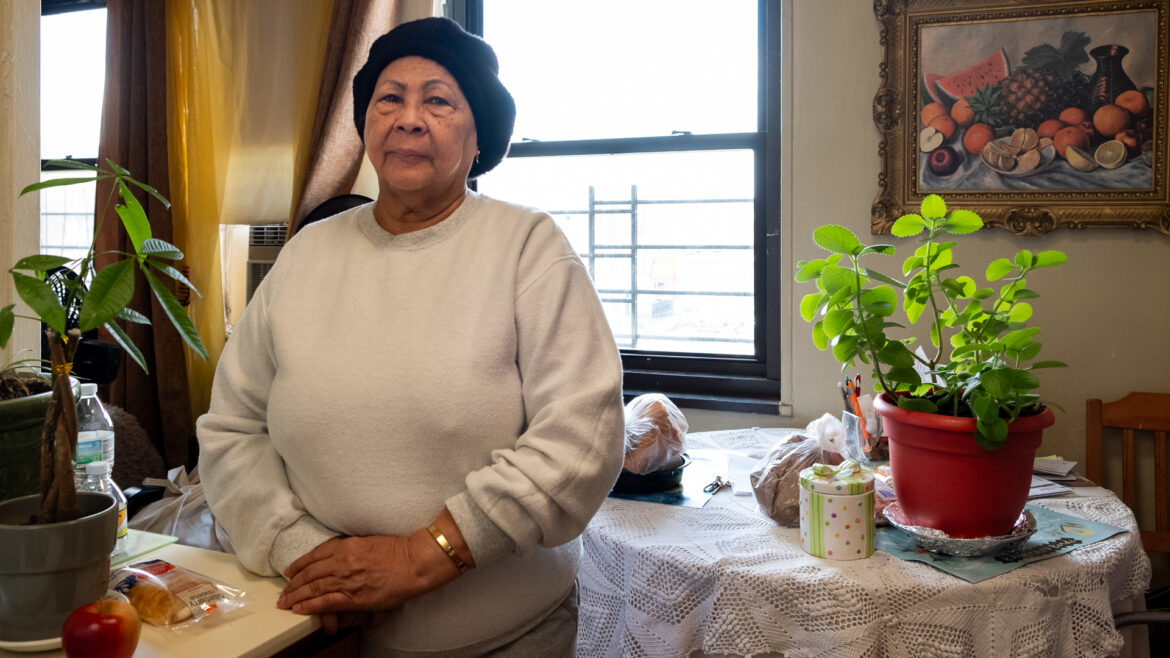
As Second NYCHA ‘Trust’ Vote Gets Underway, Bronx Seniors Weigh Their Options
While dozens of eligible voters are currently dispersed around the city, Bronx River Addition’s Building 11 remains a tight-knit community home to many Spanish speakers. Two ballot options promise expedited repairs, but could also require them to temporarily relocate.
Adi Talwar
Milagros Martínez, 78, in her 9th floor studio apartment in NYCHA’s Bronx River Addition, where she’s lived for 16 years.
Additional reporting and Spanish translation by Daniel Parra.
The lobby of Bronx River Addition’s Building 11, a mid-rise for seniors in Soundview, is plastered with information about lead and mold abatement. A caution sign sits directly beneath a hole in a ceiling that occasionally leaks, and tenants say they favor the elevator on the left, as the right one often gets stuck.
According to resident Ana Almanzar, squatters sometimes occupy the lobby, and the fourth and 10th floors.
Other signs around the entrance have important dates on them: March 13 and April 11, the bookends of an ongoing voting period. Residents of Bronx River Addition have been tasked with picking from three distinct models to finance building repairs—the second group in the city to do so.
Among the voters are 60 seniors who used to live a few blocks away in Building 12. But that low-rise was deemed uninhabitable in 2022 due to an issue with the heating system, and the tenants have been relocated to New York City Housing Authority complexes elsewhere in the Bronx, as well as in Manhattan and Brooklyn.
Meanwhile, the community at Building 11 remains tight-knit, composed of many Spanish speakers, some of whom immigrated to the United States from the Dominican Republic.
In February, two nonprofit organizations, Community Voices Heard (CVH) and the Community Service Society of New York (a City Limits funder), held a meeting in the lobby of Building 11. About 20 residents—some sitting in folding chairs, others standing—waited to hear more information about the vote.
A majority of the residents opted for the Spanish informational booklet the organizers were distributing, along with headsets for translation to follow along. One tenant asked for a headset partway through the meeting, only to learn that there weren’t any left.
Adi Talwar
January 22, 2024: NYCHA’s Bronx River Addition located at 1350-1352 Manor Avenue in the Bronx.
Together, the 199 local and dispersed Bronx River Addition tenants are following in the footsteps of those at the Nostrand Houses in Sheepshead Bay, Brooklyn, who recently opted into New York’s novel Public Housing Preservation Trust, a public entity that can issue bonds to fund repairs. Under this model, NYCHA management remains in place.
Other options on their ballots include the Permanent Affordability Commitment Together (PACT) program, which brings in outside developers and building managers, and the status quo—traditional Section 9 public housing.
On a recent Tuesday, a handful of residents described some of the hurdles they have encountered during, and leading up to, the voting process. Some said they were unsure about the differences between the options on their ballot, and one senior described mobility challenges that made it impossible for them to attend information sessions.
Still, everyone City Limits spoke to said they intended to vote.
“I want to try something different to see if things change,” said Milagros Martinez, a 78-year-old resident of Building 11, in Spanish.
Martinez moved into her studio apartment in 2008. She recalled her initial visit, thinking that the unit was “old” and “did not look good.”
“They told me that if I didn’t take it, they wouldn’t give me one for six or seven years,” she added.
Adi Talwar
March 19, 2024: Lead work area warning sign in the lobby of NYCHA’s Bronx River Addition apartment building located at 1350-1352 manor Avenue in the Bronx.
Conditions seemed to worsen after the move. There were leaks in her apartment, the heat from the radiator seemed a bit too high and on two separate occasions, water burst out. The condensation covered her floors.
“The water was black like oil,” Martinez recalled. “I lost everything at the time… these are things you don’t want to happen.”
A member of NYCHA’s resident engagement team knocked on Martinez’s door during the first week of the vote, to explain the different options on the ballot. The next day, she filled out the bubble for the Trust and is waiting to cast her vote in person.
“Under the current conditions, you never know when the problems will be fixed,” she said.
Milagros Tavera lives down the hall from Martinez. The 87-year-old has limited mobility and spends most of her days inside of her studio apartment. Tavera told City Limits in Spanish that she wasn’t able to attend any of the meetings NYCHA held and was feeling unwell when the most recent meeting took place in the lobby. She is still hoping NYCHA staff will visit her.
“No one has come in [to] explain what the options are,” Tavera said in Spanish.
Above: Milagros Tavera, 87, has been a Bronx River Addition resident for 23 years. At right: peeling paint in her apartment, which she says has never been repainted in the time she has lived there. Photos by Adi Talwar.
Tavera moved into her apartment 23 years ago. She recalled that fixes used to be made within days of a request. Now, it takes months for work orders, or “tickets,” to be closed.
Almanzar, who has lived in the building for three years, told City Limits that she attended informational meetings ahead of the vote, hosted by NYCHA, and felt confident enough to make a selection on her ballot.
Security is a concern for her. Though she is aware of a security guard on site, she said in Spanish that she still does not feel safe.
At NYCHA’s senior properties, a security guard must be present daily for at least eight hours, according to the authority. If the tenants vote for PACT or the Trust, NYCHA said, resident input would help establish security plans going forward.
During City Limits’ visit to Building 11, a NYCHA organizing director walked out of Apartment 3L on the third floor, where voters will be able to cast in-person ballots between April 2 and 11.
The engagement worker, who speaks Spanish, had informed residents like Maria Gonzalez about the ongoing vote.
Gonzalez’s primary concern is a potential construction phase, if the complex chooses PACT or the Trust.
Adi Talwar
Ana Almanzar, 70, in her friend Milagros Tavera’s apartment. Security in the building is a concern for her, she told City Limits.
“When they take out the sink, all that stuff, it hurts you, the dust,” she said in Spanish.
Tenants may be relocated as an environmental precaution if they choose either of these options, according to NYCHA. A temporary move would be unlikely if they remain in traditional public housing, according to the authority, because comprehensive renovations would not be possible with NYCHA’s existing funding.
RELATED READING: No ‘False Promises’—NYCHA Tenants Get Preview of Trust Transition
As for the relocated residents of Building 12, NYCHA has said choosing the Trust or Pact could get them home sooner. Gonzalez, who lives directly across from 3L, is also waiting to vote in person, and is keeping her decision under wraps.
She, Almanzar and Tavera all described Building 11 as a community.
“When I cook, I call everyone to come eat and if I don’t feel good, I’ll do the same and pack the apartment with people trying to help me,” Tavera said. “I would rather stay even though the conditions are not the best… it’s better than going to a place where I don’t know anybody.”
This story was produced as part of Columbia University’s Age Boom Academy.
To reach the reporter behind this story, contact Tatyana@citylimits.org. To reach the editor, contact Emma@citylimits.org.
Want to republish this story? Find City Limits’ reprint policy here.
The post As Second NYCHA ‘Trust’ Vote Gets Underway, Bronx Seniors Weigh Their Options appeared first on City Limits.

